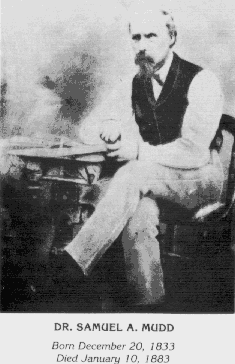By Maura James
 One-hundred twenty-eight years ago today, January 10, 1883, Dr. Samuel Mudd died of pneumonia in his Maryland home. Many folks are familiar with the Mudd name, or at least the colloquial phrase, “your name is mudd”. The doctor was forever embossed in the history books when the fugitive, John Wilkes Booth, arrived at his home around 4:00 AM on April 15, 1865.
One-hundred twenty-eight years ago today, January 10, 1883, Dr. Samuel Mudd died of pneumonia in his Maryland home. Many folks are familiar with the Mudd name, or at least the colloquial phrase, “your name is mudd”. The doctor was forever embossed in the history books when the fugitive, John Wilkes Booth, arrived at his home around 4:00 AM on April 15, 1865.
Booth, of course, had just come from Ford’s Theater in Washington, D.C., where he had successfully assassinated President Abraham Lincoln. Booth had been planning a kidnapping/assassination for years. In fact, an earlier kidnapping attempt, supposedly led by Booth, took place on one of Lincoln’s trips from the Cottage into the city, “Lincoln often went riding alone. Once they [Booth and his party] were close to getting him. What they thought was his carriage came along a deserted road. They surrounded it… But he [Lincoln] changed his plans that day, and they rode away… in a foul mode…” (Smith).
Mudd treated Booth for a broken leg. An injury he received after jumping from the President’s box to the stage at Ford’s Theater right after he shot the president. Booth stayed the night at the Mudd residence, refusing food but asking “for a razor and shaving soap… and took off his mustache” (Smith). Booth, along with an accomplice, left the Mudd’s and was finally caught on April 28th. Booth and his attendants were sentenced to be hanged, along with George Atzerodt, “a Booth hanger-on assigned to kill Vice President Andrew Johnson but who lost his nerve, dallied about, and fell into government hands” (Smith). Atzerodt’s connection to Mudd will be made clear shortly. Mudd, too, was “sentenced to life imprisonment at Fort Jefferson in the Dry Tortugas, Florida” (Columbia Electronic Encyclopedia) for aiding Booth in his escape.
Case Closed. Assassination solved.
Until, then President, Andrew Johnson pardoned Mudd in 1869. Johnson “cited doubts about Mudd’s guilt as well as his efforts during a yellow fever outbreak at the prison” (Columbia Electronic Encyclopedia). Johnson’s doubts most likely came from Mudd’s claim that he did not recognize the disguised Booth on the morning of April 15th and aided the man as a doctor is sworn to do in the Hippocratic Oath. Mudd’s family maintains, to this day, Dr. Samuel Mudd’s innocence and is still embroiled in a court battle to get the conviction stricken from the record. As Richard Mudd, a descendent of the doctor, asked, “If he was your grandfather, would you leave him out there, falsely accused, for all time?” (Current Events).
Though the claims of the Mudd family are touching and a terrible injustice was committed if Mudd did not recognize Booth, there are some glaring coincidences. “He [Booth] knew Mudd. He had spent a night at the doctor’s home a few months earlier while scouting… the proposed abduction route and had met with him in a Washington hotel for several hours’ drink and talk” (Smith). The Mudd family does not deny the doctor’s association with Booth. What’s more, George Atzerodt’s confession indicts Booth. “In his confession, Atzerodt said, “I am certain that Dr. Mudd knew all about it [Booth’s assassination plans], as Booth sent… provisions for the trip… about two weeks before the murder, to Dr. Mudd’s” (Current Events). Considering Mudd’s Confederate sympathies, these facts are hard to ignore.
The Mudd case is interesting. Even if Mudd did recognize Booth there was no way he could have known about the assassination unless Booth told him that night. Lincoln did not die until the morning of April 15th, a few hours after Booth would have arrived at Mudd’s. Regardless of Mudd’s knowledge of the successful assassination, he surely must have been aware of Booth’s anti-government feelings following their meeting in Washington and at his home. What do you think, Cottage blog readers? Is Dr. Samuel’s name mudd? Or should his conviction be cleared?
Ms. James is a Historical Interpreter at President Lincoln’s Cottage.
Works Cited
“His Name Is Mudd.” Current Events 101.3 (2001): 3. Academic Search Premier. EBSCO. Web. 7 Jan. 2011.
“Samuel Alexander Mudd.” Columbia Electronic Encyclopedia, 6th Edition (2010): 1. Academic Search Premier. EBSCO. Web. 7 Jan. 2011.
Smith, Gene. “The Booth obsession. (Cover story).” American Heritage 43.5 (1992): 104. Academic Search Premier. EBSCO. Web. 7 Jan. 2011.
